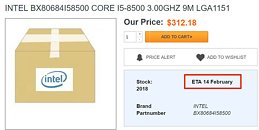The Zen 4c Cores in the Ryzen 8000G APUs are Clocked Slower than the Zen 4 Cores
AMD has revealed the full specs of its upcoming Ryzen 8000G APUs and it turns out that the Zen 4c cores aren't clocking as high as the Zen 4 cores in the Ryzen 5 8500G and Ryzen 3 8300G. We should point out that the 8300G has a singular Zen 4 core and three Zen 4c Cores here, so there's no confusion. The Zen 4 cores in the 8500G have a base clock of 4.1 GHz, while the 8300G comes in at 4.0 GHz, with both of the APU's Zen 4c cores having a base clock of 3.2 GHz. Oddly enough, AMD lists the overall base clock of the 8500G as 3.5 GHz and the 8300G as 3.4 GHz with a notice that reads "Represents the average effective base frequency of all cores." AMD is in other words averaging the clock speeds of the two different cores to come up with an approximate base clock.
The Zen 4 cores in the 8500G boost up to 5 GHz, with the 8300G boosting to 4.9 GHz, whereas the Zen 4c cores in the 8500G boost up to 3.7 GHz and in the 8300G to 3.6 GHz. Here AMD doesn't provide an estimated frequency equivalent. Despite being budget models in the Ryzen 8000G-series of APUs, both SKUs get two USB4 ports with full 40 Gbps capabilities, plus a pair of USB 3.2 Gen 2 (10 Gbps) ports. Furthermore the Radeon 740M GPU will be clocked at 2.8 GHz in both APUs, but both SKUs are limited to a mere four graphics cores, whereas the Ryzen 5 8600G gets eight at the same clock speed and the Ryzen 7 8700G gets 12 at 2.9 GHz. All four APUs also support DisplayPort 2.1.
The Zen 4 cores in the 8500G boost up to 5 GHz, with the 8300G boosting to 4.9 GHz, whereas the Zen 4c cores in the 8500G boost up to 3.7 GHz and in the 8300G to 3.6 GHz. Here AMD doesn't provide an estimated frequency equivalent. Despite being budget models in the Ryzen 8000G-series of APUs, both SKUs get two USB4 ports with full 40 Gbps capabilities, plus a pair of USB 3.2 Gen 2 (10 Gbps) ports. Furthermore the Radeon 740M GPU will be clocked at 2.8 GHz in both APUs, but both SKUs are limited to a mere four graphics cores, whereas the Ryzen 5 8600G gets eight at the same clock speed and the Ryzen 7 8700G gets 12 at 2.9 GHz. All four APUs also support DisplayPort 2.1.








